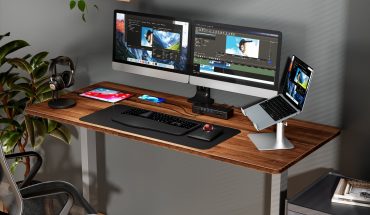Toronto-based AI startup Skinopathy is revolutionizing dermatology for patients and healthcare providers with a first-of-its-kind application, called the GetSkinHelp app.
With a click of a smartphone camera and a robust Canadian-built backend platform, the GetSkinHelp app connects those with a skin concern to appropriate healthcare services, including in-person or virtual appointments with specialists who can prescribe medications and treatment through the app, as well as facilitate quicker biopsies for urgent cases.
“We created Skinopathy to make sure everyone can have accessible and inclusive access to dermatological care,” stated Dr. Colin Hong, who serves as Skinopathy chief medical officer.

Dr. Colin Hong
“And so far, we’ve had the complete spectrum of patients, regardless of age, gender, or location from across Canada,” added Dr. Hong. “As long as you have a phone or a computer, plus access to the Internet, you can use our services.”
It’s showing promise as a win-win dermatology app.
To date, for example, more than 2,300 doctors have referred over 24,000 patients to Skinopathy. Clinician benefits cited include fewer no-show appointments, increased efficiency by pre-loading patient information into the electronic medical record and automatically generating consult notes, allowing specialists to see more patients per unit of time.
On the patient side, GetSkinHelp is proving to be life changing. Take Toronto-resident Jennifer Edey, for example, whose mother noticed a suspicious spot on her nose and used GetSkinHelp to screen for skin cancer. “I’m not sure we would have prioritized seeing a doctor as quickly as we did without using GetSkinHelp AI,” said Edey.
How does it work?
 Users snap a photo of what they think may be a suspicious mole on their smartphone, for example, and through a backend process that uses a neural network-based technology, the app determines the difference between a benign condition and a cancerous lesion.
Users snap a photo of what they think may be a suspicious mole on their smartphone, for example, and through a backend process that uses a neural network-based technology, the app determines the difference between a benign condition and a cancerous lesion.
A separate advanced computer vision feature assesses the snapped image according to the ABCD rule for skin cancer, measuring asymmetry, looking for irregular borders, assessing colour and measuring diameter. The app currently discerns between eight conditions, including basal cell carcinoma, squamous cell carcinoma, melanoma and benign moles, with 88% accuracy.
An automated triage feature then determines the level of urgency, alerting users when they should be seen right away or whether it’s okay to take a more ‘wait-and-see’ monitoring approach, using the app to continue tracking their mole. If they don’t have a family doctor to follow up with on their own, or if the wait time for a dermatology referral is too long, they can use the app to book an appointment with a Skinopathy clinician.
The initial idea for a skin cancer screening app came to Dr. Hong, during Ontario’s first Covid-19 lockdown when he noticed that patients were showing up with advanced skin lesions that turned out to be late-stage cancer. He thought there had to be a better way to help people screen their moles accurately for early detection and after brainstorming with Loo, the app was born.
“Unfortunately, when early-stage cancers are missed, it’s often too late for patients and it also places a larger burden of care on the healthcare system. Our goal is to make sure that people who need a doctor get in front of the doctor,” said Skinopathy data scientist Mahla Abdolahnejad, one of six interns recruited by Skinopathy through Mitacs.
Abdolahnejad joined the team as a PhD candidate in 2021 to lend her machine learning expertise and has since accepted a full-time position, helping to refine and train the companies AI models as data is continually collected by the platform.
Mitacs
To advance their technology quickly with limited resources, Skinopathy turned to academics and data scientists at Canadian universities, coordinated through programs by organizations such as Mitacs, a leading Canadian innovation organization funded by the Government of Ontario and Government of Canada, that helps boost homegrown innovation.
“There’s so much great technology available today, but for many reasons, medical science hasn’t kept up,” said Dr. Hong .“Our partnership with Mitacs provides access to fresh, eager graduate students who bring new perspectives and out-of-the box thinking to the table, helping to advance this groundbreaking technology in record time.”

Dr. Stephen Lucas
“Skinopathy is a powerful example of how Canadian innovation fueled by research talent from our own universities can lead to smarter, more accessible healthcare,” explained Dr. Stephen Lucas, CEO of Mitacs. “We’re proud to help accelerate made-in-Canada solutions that directly benefit patients and strengthen our health systems.”
For Abdolahnejad, who recently won Best Machine Learning Practitioner at the 2024 AIMed Conference in Florida on behalf of Skinopathy, the opportunity to find meaningful work in a field where her expert knowledge is truly making a difference in the lives of others is a dream come true.
I asked Dr. Lucas about the uptick in AI requests in healthcare and other sectors.
“Mitacs has seen a noticeable increase in interest in artificial intelligence from healthcare startups across the country, particularly in projects that apply AI for medical imaging, clinical decision support, personalized medicine, and patient triaging,” shared Dr. Lucas. “We connect enterprises with much-needed top talent to address real-world challenges through innovation and, ultimately, benefit Canadians. Notably, companies like Skinopathy are part of a growing wave that combines deep tech with direct healthcare relevance.”
Dr. Lucas further revealed, “We are also noticing strong momentum in artificial intelligence applications in areas such as energy and resource management, advanced manufacturing and supply chain optimization, public infrastructure and smart cities, and cybersecurity and fintech. These trends reflect business priorities around responsible AI adoption and innovation-driven growth. They show strong alignment with federal strategies like the Pan-Canadian Artificial Intelligence Strategy, which emphasize commercialization, talent retention, and public-good applications.”
Data Use and Security
Sharing and accessing health-related data is central to the app’s functionality and credibility.
Explained Dr. Hong, “Every element of a patient’s chart is a data point in the GetSkinHelp app. This allows us to automate actions including generating consult notes and other clerical tasks.
More importantly, this data can be used to triage patients to the right doctor. For example, with skin cancer, a lesion can be so very concerning that bypassing a dermatologist and sending them
directly to a surgeon is the best course of action. This ensures that patients receive timely and accurate care, plus it reduces wait times and generally improves patient outcomes.”
Added Dr. Hong, “We can also assess patient data to provide insights into skin conditions, suggest treatments, and manage prescriptions. This integration ensures that all relevant information is readily available to both clinicians and patients, facilitating better decision-making and continuity of care.”
I asked about data security to which Dr. Hong described, “First and foremost, we adhere to all provincial and federal laws surrounding the handling of personal health information.”
“We prioritize the security and privacy of patient data by adhering to, and often exceeding, industry best practices and regulatory requirements,” stated Dr. Hong. “We implement strict access control measures, advanced encryption protocols, and regular risk assessments to ensure that sensitive information is protected.”
“Additionally,” remarked Dr. Hong, “our Clinical Advisory Board ensures that our AI algorithms and clinical workflows align with guidelines from the College of Physicians and Surgeons of Ontario (CPSO) and the College of Nurses of Ontario (CNO).”
Other Skinopathy AI-powered Solutions
“Skinopathy is continuously innovating and developing new applications to enhance dermatological care,” said Dr. Hong, and described its other notable projects:
- Skinopathy Wounds: An AI-powered tool that provides standardized baseline data about wounds and pressure injuries, including spatial measurements and colorimetric analysis. This tool will help nurses in long-term care facilities provide better care for their residents .
- Skinopathy OS: An intelligent triaging, automation, and medical insights platform for healthcare practitioners that takes many of the clerical burdens away from doctors so they can focus on patient care .
- Skinopathy Burns: A mobile tool for first responders that uses camera images to assess the depth and area of burns, providing recommendations on patient transfer and informing the circle-of-care .
- Skinopathy Vitiligo: An AI-powered app designed to support and empower vitiligo patients across the globe. Skinopathy is working alongside the Vitiligo Research Foundation, one of the world’s most notable vitiligo charities, to help the 100 million+ people suffering from vitiligo around the world. In fact, we are excited to celebrate World Vitiligo Day (worldvitiligoday.ca) at the MaRS Waterfront on June 25 and continue our efforts to improve vitiligo management.
Dr. Hong summarized, “these applications are designed to provide real-world and real-time solutions for screening, triaging, tracking, and managing all skin conditions.”
-30-



